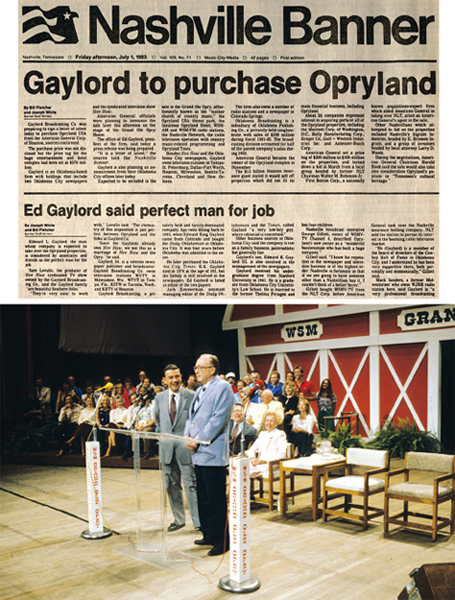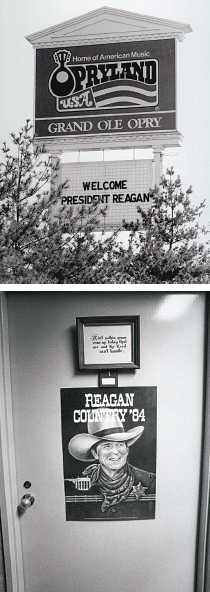The Grand Ole Opry (36 page)
Read The Grand Ole Opry Online
Authors: Colin Escott


UNDER NEW MANAGEMENT
I
n 1968, National Life became part of NLT Corporation. The following year, WSM’s founder, Edwin Craig, died. In 1982, a rival
insurer, American General Corporation in Houston, launched a hostile takeover. The board of NLT went as far as trying to convince
investor Warren Buffett to buy NLT to ensure its independence from American General. Then NLT tried to turn the tables on
American General by launching a hostile bid, but that only had the effect of ratcheting up the price that American General
eventually paid. The debt incurred in purchasing NLT ensured that American General would place National Life’s entertainment
properties on the block.
MARGARET ANN ROBINSON,
daughter of WSM founder Edwin Craig:
It was the biggest blow I have ever survived and the biggest blow my family has ever survived. It was a terrible, crushing
personal blow because we were so closely involved with the people who worked at National Life and their families. National
Life was run like a family.
top:
Nashville Banner,
July 1, 1983.
below: Bud Wendell and Ed Gaylord announce the sale of the Opryland properties to Gaylord Broadcasting.
SONIA L. NAZARIO,
journalist, in the
Wall Street Journal:
“It’s the mother church of country music,” says Tom T. Hall. “Who goes and sells off your church?” The answer is American
General Corp. of Houston. Minnie Pearl, who has been bemoaning her ill-fated attempts to “ketch a feller” since 1940 sees
little humor in the proposed transaction. “It’s our Opry, our womb, our cocoon. We’re like children who’ve always had the
same babysitter.” But American General says it needs to drum up between $400 million and $700 million to help offset debts
that triple to $950 million with the $1.5 billion NLT purchase. Besides, “businesses that are off our main thrust probably
don’t fit,” says Harold Hook, chairman of American General. Whether the locals like it or not, it will be hard to find a parent
as attuned to the Opry as NLT’s National Life.
When American General spun off WSM, the Grand Ole Opry, Opry-land, and its other media properties in July 1983, it was to
Gaylord Broadcasting of Oklahoma City, a company very much attuned to the background and core values of National Life’s entertainment
group. Gay-lord was already producing
Hee Haw
at the Opryland complex.
BILL ANDERSON:
American General couldn’t have cared less about the Grand Ole Opry. All they wanted to do was get rid of it. Mister Gaylord
had gotten involved in Nashville through
Hee Haw,
and I wouldn’t be a bit surprised if some of the
Hee Haw
stars, like Roy Acuff and Minnie Pearl, didn’t twist his arm a little bit.
The turmoil came just as Bud Wendell was finalizing a bold plan to take National Life’s entertainment group into cable television.
BUD WENDELL:
Ultimately as WSM, Inc., evolved into Opryland, we became bigger than National Life. We felt that there really was an opportunity
to create a cable channel of country music. Cable was in its infancy, but we were watching it very closely and we just felt
that there was an opportunity, so we went to our owners at National Life and said to them, “This is a high-risk proposal;
a very high-risk proposal.” The business plan we put together [indicated] that if we did as well as we thought, it would take
us five years to turn a profit, and in that five years we were going to lose about sixty million dollars. But if it worked
the way we thought it would, from that point on it was going to be fabulously successful. And they believed us, so they said,
“Okay. Go ahead.” So we built The Nashville Network, and we added one thousand rooms to the hotel. We were building the network
and spending the money when National Life was taken over. American General saw what was going on and it scared them to death,
so they put us up for sale. At the same time, I had been acquainted with Ed Gaylord, because we were producing
Hee Haw
for him . . . so as soon as American General said that they were going to sell us, [Gaylord’s] people came to me and said,
“We really would be interested in looking at this.”
BILL FLETCHER,
journalist, in the
Nashville Banner:
American General handed the reins of the huge Opryland complex to Ed and Thelma Gaylord, but WSM Inc. chairman Bud Wendell
will remain in the driver’s seat. A well-placed source said the sale price is “in the neighborhood of $270 million.” The source
said that only American General and top Gaylord officials know the actual price. Dignitaries from Houston, Oklahoma City,
and Nashville filled the Grand Ole Opry House. It was already decided that the destiny of the Opryland complex, including
the Grand Ole Opry, the theme park, the Opryland Hotel, the tours, and the new Nashville Network will remain in the hands
of local people. Gaylord pledged to become “one of the best corporate citizens in the Nashville area.”
TNN made its debut on March 7, 1983, and, on April 13, 1985,
The Grand Ole Opry Live
began as a thirty-minute show on the network.
HAL DURHAM:
When we put the Opry out on TNN, a lot of people who were not familiar with the Opry could see what it was. After the NBC
network dropped the Prince Albert show, we’d only been on WSM-AM, but with the addition of television we were able to be in
homes all across the country, as we once had been at the height of network radio. And, as you might expect, there was additional
exposure for the artists on the show. There was some reluctance at first, but we found that all the artists wanted to be on
the televised portion because they’ve seen the results of what that exposure can do for them.
BILL ANDERSON:
If you look at some of the very earliest Opry television shows from the 1950s, you’ll see merry-go-rounds and things like
that on there that were no part of the Opry then or any other time, but when they finally decided to televise the Opry just
like it was—warts ’n’ all—that’s when the Opry began to succeed on television. The broadcasts on TNN had an enormously positive
impact. In fact, a lot of people began thinking that the Opry was a television show. Television put a face on the Grand Ole
Opry and took it to places where it had never gotten during the later years of AM radio.
In June 1986, Opryland branched into another area of the music business when it bought Acuff-Rose Publications from Wesley
Rose and Roy Acuff. The price was not revealed, but Acuff-Rose was valued at around twenty million dollars at the time. The
company had begun in 1942 when Acuff guaranteed Fred Rose twenty-five thousand dollars.
The Nashville Network arrived at a turning point in country music history. In 1981, at the height of the
Urban Cowboy
craze, country music accounted for fifteen percent of record sales, but by 1984, its share had dropped to ten percent or
less. Just as the Opry had to solve the problem of its aging cast, country music itself needed new performers and new direction.
The Opry’s problem was highlighted when seventy-three-year-old President Ronald Reagan visited the Friday Night Opry to celebrate
Roy Acuff’s eighty-first birthday.
JIM O’HARA
and
ED CROMER,
journalists, in the
Tennessean:
A toe-tapping, singing Ronald Reagan brought his upbeat re-election campaign to the stage of the Grand Ole Opry. It coincided
with Roy Acuff’s 81st birthday celebrations. Lee Greenwood broke into a rendition of “God Bless the U.S.A.,” with Reagan and
others on stage and many in the crowd singing along as confetti dropped from the ceiling. The words to the song, which is
featured in a Reagan television commercial, were printed on the backs of old-fashioned church fans passed out among the crowd.
PRESIDENT RONALD REAGAN:
We’re here today to celebrate the eighty-first birthday of the King of Country Music. And, Roy, the other day I met with some
senior citizens in the White House, and I told them the only way I could sum up my feelings about older folks is to greet
them by saying, “Hi, kids.” I was thinking on my way down here in the plane: All of you are aware, I think, that there’s a
great resurgence of patriotic feeling sweeping the country. And it’s heartening, and I’ve been moved by it. You could see
it during the Olympics, how the crowds out in Los Angeles would wave the flag and sing along to “The Star-Spangled Banner.”
Now, there are a lot of reasons, I guess, why this good spirit has returned to our land. But it got a lot of encouragement
from Nashville. It’s the people of this city who never forgot to love their country, who never thought patriotism was out
of style. And I know you were just expressing how you felt; you didn’t know that you were doing your country a great service
by keeping affection for it alive in your songs. But you were doing it a service, and I don’t know if anyone has ever thanked
you. But if not, thank you. People like you make me proud to be an American.
Now, the [Democrats] keep saying the answer to all [our] success is to start another old round of tax and tax and spend and
spend. I think we all better remember that the [Democrats’] promises are a little like Minnie Pearl’s hat—they both have big
price tags hanging from them.
And nostalgia played a large role in the Opry’s sixtieth anniversary show in November 1985. CBS-TV taped a special that aired
on January 14, 1986. A segment of the show was given over to the Opry’s veterans back home at the Ryman. Even Roy Acuff had
become a little sentimental about the Ryman after ten years away.

Roy Acuff decorated his dressing room door in honor of President Reagan’s visit.
MINNIE PEARL:
We reminisced a lot that night. When Roy Acuff walks out on that stage singing “The Wabash Cannonball,” and I stand in the
wings and watch him, it’s as if I’m with him playing in rural Alabama on a rainy Monday night in the 1940s. To me, his voice
hasn’t changed in its rendition, in his fervor, and in his love of that audience. And when I walk out onstage, I feel something
special. The Opry audience is different from any other audience. They’ve sent in for those tickets and have come here especially
for the show. The majority of them are there because they care. “The Ryman Remembered” is my favorite part of the show. We
had such a feeling of déjà vu. I love the new Opry House, but back in the Ryman I felt the ghosts. I thought about what kind
of person I was back then. I said to Roy while they were changing a camera angle, “What are you thinking about?” He was looking
off so far away. He said he was thinking about all the people that had sat there in the Ryman in those old pews and what their
hopes and dreams were.

President Ronald Reagan wishes Roy Acuff a happy eighty-first birthday.
Returning to the Ryman only emphasized how integral the Opry had once been to country music. It was still the most important
stage in country music, but now the show’s managers had to find its new role.
